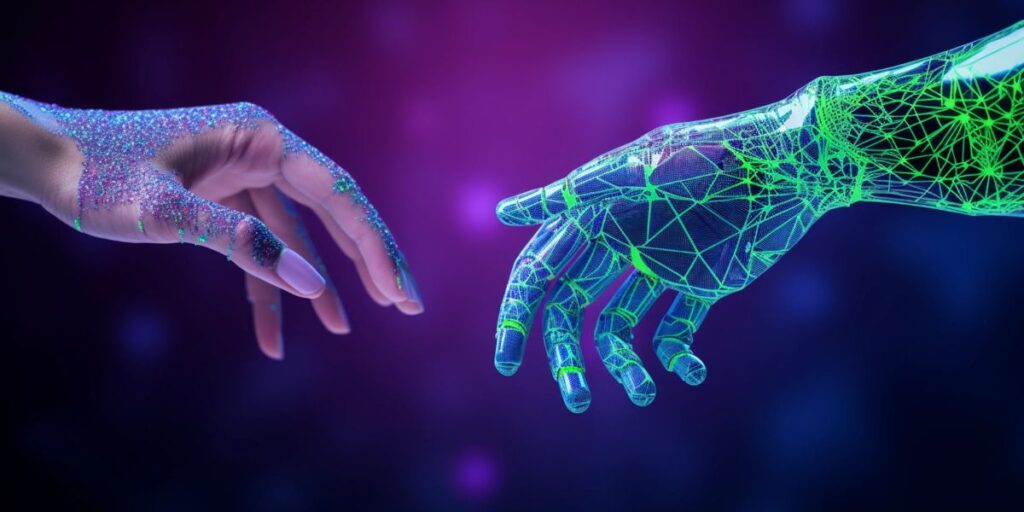artificial intelligence definition in simple words, Artificial Intelligence, or AI, is a computer field that concentrates on developing machines or systems that can execute tasks normally needing human smarts. These tasks can include language comprehension, pattern recognition, problem-solving, decision, and learning from past experiences.
What is AI All About?
Fundamentally, AI involves programming computers or machines to think and perform like humans. Picture a robot that can tidy your house, respond to your inquiries, or even operate a vehicle. Such robots use AI to comprehend their environment, make judgment calls, and fulfill tasks. Through AI, machines learn from data intake, identify patterns, and enhance performance over time without individual programming for each possible situation.
AI Categories
AI falls into two main categories, Narrow AI and General AI.
- Narrow AI, Known as Weak AI, this kind of AI performs one specific task, like facial recognition, web searches or functions of autonomous cars. It only works within a limited number of parameters and can’t handle tasks its specialised area. The majority of presently existing AI applications fall under Narrow AI.
- General AI, Often called Strong AI, this category aims to comprehend, learn from, and carry out any intellectual tasks humans can do. It’s more flexible and adaptable than Narrow AI. however, it remains a theoretical entity not yet brought to life.
AI Functioning Explained
AI operates by marrying vast amounts of data with quick iterative processing and smart algorithms. This amalgamation enables the software to self-learn from the patterns or attributes in the data. Here is a brief explanation of how an AI system works,
- Data Gathering, A Substantial amount of data is required for an AI system to learn and make conclusions. This data can originate from diverse sources like sensors, databases or the internet.
- Data Processing, After amassing the data, it goes through processing to derive valuable information. This involves purifying the data, converting it into a usable format, and then thoroughly examining it.
- Learning Stage, In this stage, algorithms are used by the bot block=”” ai to enable learning from preprocessed information. The learning process could be supervised (learning with labeled data), unsub
The Role of AI in Our Daily Activities
We encounter AI regularly in our everyday routines, although we might not always notice. Here are some routine examples,
- Voicepowered Assistants, and Virtual helpers like Siri, Alexa, and Google Assistant use AI to answer questions, set reminders, and manage IoT devices.
- Suggestion Systems, Platforms like Netflix, Amazon, and Spotify utilize AI to suggest films, products, or tunes tailored to your taste and past behavior.
- Health Sector, In medical care settings AI lends a hand by diagnosing illnesses, forecasting disease outbreaks, and personalizing treatment options.
- Autonomous Vehicles, Cars with self-driving functionality use AI for road navigation, obstacle detection/avoidance, and deciding on driving actions.
- Customer Support, A significant number of businesses employ AI-powered chatbots for handling customer queries and offering help.
- Why Should We Pay Attention to AI?
The potential held by AI can lead to substantial changes in various fields of our life. So here are a few reasons why it’s crucial,
- Productivity With its speedy task execution abilities along with high accuracy rates, AI elevates productivity levels significantly.
- Innovation By facilitating novel products/services or business models, Artificial Intelligence acts as a catalyst for innovation.
- Customization The technology permits superior custom experiences such as curated suggestions or precision targeting in ads.
Understanding Problems and Choices
AI offers many advantages but also brings certain issues and important choices,
- Ethics, Making sure AI is used properly and doesn’t cause harm or continue biases is important.
- Privacy, Using large data by AI systems creates privacy worries.
- Job Displacement, Jobs could be taken over by AI, leading to impacts on the economy and people’s lives.
- Security, Protection of AI systems from misuse or harmful attacks is necessary.
The Ending
The field of Artificial Intelligence is growing and impactful, working to create machines that can do jobs usually done by humans. From virtual help to self-driving cars, AI has a huge effect on our daily life. It’s full of potential for new ideas and better ways of doing things, but we need to fix the ethical, privacy, and security challenges it brings up. If we understand AI in simple words, we’ll value its skills more and use it wisely for society’s good.
